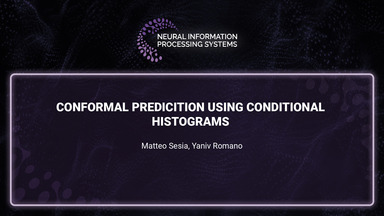Cryptographic Hardness of Learning Single Periodic Neurons
Dec 6, 2021
Speakers
Min Jae Song
Speaker · 0 followers
Ilias Zadik
Speaker · 0 followers
Joan Bruna
Speaker · 4 followers
About
We show a simple reduction which demonstrates the cryptographic hardness of learning a single periodic neuron over isotropic Gaussian distributions in the presence of noise. More precisely, our reduction shows that any polynomial-time algorithm (not necessarily gradient-based) for learning such functions under small noise implies a polynomial-time quantum algorithm for solving worst-case lattice problems which form the foundation of lattice-based cryptography. Our core hard family of functions, which are well-approximated by one-layer neural networks, take the general form of a univariate periodic function applied to an affine projection of the data. These functions have appeared in previous seminal works which demonstrate their hardness against gradient-based (Shamir, 2018), and Statistical Query (SQ) algorithms (Song et al., 2017). We show that if (polynomially) small noise is added to the labels, the intractability of learning these functions apply to all polynomial-time algorithms, beyond gradient-based and SQ algorithms, under the aforementioned cryptographic assumptions. Moreover, we demonstrate the necessity of noise in our hardness result by designing a polynomial-time algorithm for learning certain families of such functions under exponentially small adversarial noise. Our proposed algorithm is not a gradient-based or an SQ algorithm, but is rather based on the celebrated Lenstra-Lenstra-Lovász (LLL) lattice basis reduction algorithm.We show a simple reduction which demonstrates the cryptographic hardness of learning a single periodic neuron over isotropic Gaussian distributions in the presence of noise. More precisely, our reduction shows that any polynomial-time algorithm (not necessarily gradient-based) for learning such functions under small noise implies a polynomial-time quantum algorithm for solving worst-case lattice problems which form the foundation of lattice-based cryptography. Our core hard family of functions,…
Organizer
NeurIPS 2021
Account · 1.9k followers
About NeurIPS 2021
Neural Information Processing Systems (NeurIPS) is a multi-track machine learning and computational neuroscience conference that includes invited talks, demonstrations, symposia and oral and poster presentations of refereed papers. Following the conference, there are workshops which provide a less formal setting.
Like the format? Trust SlidesLive to capture your next event!
Professional recording and live streaming, delivered globally.
Sharing
Recommended Videos
Presentations on similar topic, category or speaker
Q&A 4
Watch later
Felipe Tobar, …
Total of 0 viewers voted for saving the presentation to eternal vault which is 0.0%
Conformal Predicition using Conditional Histograms
Watch later
Matteo Sesia, …
Total of 0 viewers voted for saving the presentation to eternal vault which is 0.0%
Modeling Heterogeneous Hierarchies with Relation-specific Cones
Watch later
Yushi Bai, …
Total of 0 viewers voted for saving the presentation to eternal vault which is 0.0%
Trash or Treasure? An Interactive Dual-Stream Strategy for Single Image Reflection Separation
Watch later
Qiming Hu, …
Total of 0 viewers voted for saving the presentation to eternal vault which is 0.0%
Reliable Decisions with Threshold Calibration
Watch later
Roshni Sahoo, …
Total of 0 viewers voted for saving the presentation to eternal vault which is 0.0%
Structure learning in polynomial time: Greedy algorithms, Bregman information, and exponential families
Watch later
Total of 0 viewers voted for saving the presentation to eternal vault which is 0.0%





